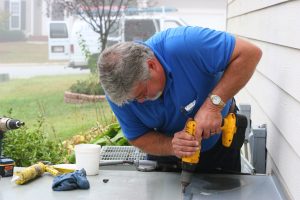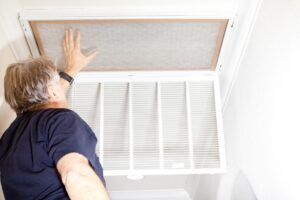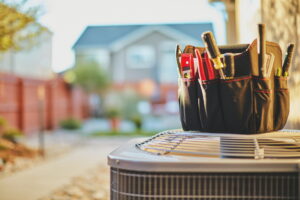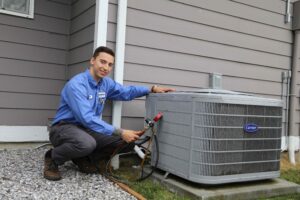Is your house ready for spring?

Man Cleaning Gutters on Ladder
Although this winter has brought us an unusual amount of school-canceling, perilous-driveway-navigating, and downright gloomy weather, spring is inevitable. And while this light at the end of the tunnel may seem miles and miles away, the last thing we want is for the warmer weather to take us (and our house) by surprise.
What are some steps to take towards a smooth spring transition?
Exterior Inspection
While we have the ability to don our heavy-duty rain apparel in wet weather, our houses are outside and without Gortex through rain, wind, sleet, and snow here in the Pacific Northwest. At the end of every winter season it’s a good idea to do a walkaround of your property and visually inspect your property to catch issues, especially in the following problem areas:
Roof
Your roof takes the brunt of winter weather. You can even do a simple inspection of your roof without stepping on a ladder. If your eyesight isn’t the best, grab a pair of binoculars or even your iPhone camera to zoom in and check for obvious changes. Shingles popping up, buckling, cracking, or just not looking right? Better call in a roofer to tackle things.
Chimney
Although your masonry fireplace may have been cozy in the winter, water damage to your chimney joints can leave your house decidedly un-cozy if not taken care of. If you spot crumbling masonry, vegetation, or a calcium-like buildup on your chimney, you may need to reseal your chimney with a water-resistant barrier.
Gutters
Get rid of those leaves taking up residence in your gutters and downspouts. You wouldn’t want accumulated debris causing water damage to your eaves or trim, or pooling around your foundation, would you? Full gutters may also be inviting to critters who can wreak havoc on your attic space.
Windows
Check to make sure any caulking or weather stripping around your windows is intact and recaulk if needed; a tight seal around your windows will keep leakage to a minimum and will help your heating/cooling system to work more efficiently. It doesn’t hurt to give your windows a solid cleaning as well–but try to avoid harsh chemicals and abrasives when doing so as to not cause damage to the glass, sills, frames, or screens.
Deck and Porches
Decks, patios, porches, stairs and railings may need special attention after a long and wet winter. Check to make sure there is no warping, discoloration, splintering, loose boards or accumulated debris. Wood decks and fences should also be treated every 4-6 years, if the stain doesn’t look like it should or water has turned some of the wood a dark grey, hire a deck professional to treat your deck and fence.
Landscape
Trim vegetation back from structures; errant limbs and leaves can leave marks in your home’s paint and may require time and money to fix. You can also start planning or executing projects–like gardens, ponds, walkways, or any other landscaping changes you’d like to make on your property so that you’re not behind come summer.
Interior Upkeep
Bust out the Dustbuster, unearth the mop, and take a deep breath: spring is in the air. Or is that just the smell of Lemon Pledge? Cleaning up around the house is a great way to usher in a new season and get us ready for warmer weather. Now that the outside of our house is taken care of, what’s on the list for the inside?
General Cleaning
Here’s where that Pledge may come in handy. Doing a sweep of the house and cleaning the oft neglected things–dusty nooks and crannies, window coverings, tops of cabinets, ceiling fans, backsplashes, etc.–will not only make things look nicer, it was also improve your indoor air quality (IAQ) by eliminating some pesky allergens like dust and pet dander.
Read: Got Dust? The Spots You May Be Missing
Air Conditioner Maintenance
Speaking of limiting allergens–making sure your air conditioner is running smoothly and efficiently is an excellent way to keep you and your home healthy. You should change the filter, check hose connections for leaks, and make sure the drain pans are draining freely. You can always schedule a maintenance appointment with a professional if you suspect your unit is not functioning properly.
Attic Inspection
Mold, insects, and mice–oh no! Inspect your attic and crawl spaces to make sure none of these invasive issues have made your home <their home. The right ventilation and insulation will deter mold or pests from colonizing further (especially in the warmer months to come). If you’re not comfortable doing this yourself, bringing in a professional may be necessary to fully assess the situation.
Read: 10 Things You Don’t Know Are in Your Crawlspace
Basement Care
Much like your attic, your basement requires special seasonal attention as well. Basements are prone to dampness and insects and need to be ventilated properly. If you spot cracks in poured-concrete walls, find insect tunnels in any wood framing, or suspect other issues, you may need to call in a professional to keep your basement safe.
A new season means a new list of maintenance projects. Stay ahead of the curve by checking in with your home and catching potential issues before they get out of hand and cost you serious time and money. While many aspects of this list can be done by you, the homeowner, there are professionals to help you assess situations and perform more in-depth maintenance if need be. What’s on your spring cleaning list?
Continue Reading
Posted in Air conditioning, Annual Maintenance, Blog, Crawl Spaces, Healthy Home, Healthy Homes, High Efficiency, High Efficiency Systems, Home Improvement, IAQ, Indoor Air Quality, Insulation, moisture, Mold, Windows | Comments Off on Spring Maintenance Checklist










